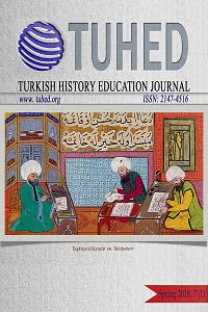Yayın Kritiği: History without Chronology (Kronolojisiz Tarih)
Tarihin ayrılamaz bir parçası olarak gördüğümüz kronoloji ne zaman, niçin ve nasıl tarih bilimine eklemlenmiştir? Bugün kullandığımız kronoloji hangi zaman teorisini esas alır ve bu teori hala geçerli midir? Zaman ve değişim kavramları ile bu derece içli dışlı olan bir disiplin nasıl olur da her iki kavramı da yanlış anlar? Doğal zamanı, yapay ve metrik bir kronolojiye, değişimi ise statükoya dönüştürür? Tüm bu soruların cevaplarını arayan bu çalışmada Tanaka kronolojinin eklenmesinden öncede de tarihin var olduğu, dolayısıyla sanılanın aksine kronoloji ile tarihin ayrılabileceği ve böyle bir ayrımın tarihi güçlendireceği tezini savunur. Yazar, tezini savunmak amacıyla bu kitapta modernite öncesi zaman anlayışını, kronolojinin tarihe eklemlenmesinin arkasında yatan nedenleri ve kronolojiden tamamen arındırılmış değil ama kronoloji vurgusu azaltılmış bir tarih yazımının yaratacağı fırsatları ortaya koymaya çalışır.
Anahtar Kelimeler:
Tanaka, Tarih, Kronoloji, Mutlak Zaman, Göreli Zaman
Book Review: History without Chronology by Stefan Tanaka
When, why and how did the chronology, which we see as an inseparable part of history, has been attached to the science of history? Which time theory is this chronology is based on and is this theory still valid? How can a discipline that is so introverted with the concepts of time and change, misunderstand both concepts? Converts natural time into an artificial and metric chronology, and change into a status quo? In this study, which searches for the answers to all these questions, Tanaka defends the thesis that there was history before the addition of chronology, therefore, contrary to the common belief, chronology and history can be separated and that such a distinction will strengthen history. In order to defend his thesis, the author tries to reveal the pre-modern understanding of time, the reasons behind the articulation of chronology to history, and the opportunities to create a historiography that has not been completely purified from chronology but with reduced chronology emphasis.
Keywords:
Tanaka, History, Chronology, Absolute Time, Relative Time,
___
- Breisach, E. (2003). On the future of history. The postmodernist challenge and its aftermath. Chicago: Th University of Chicago.
- Chartier, R. (2011). History, time, and space. Republics of Letters: A Journal for the Study of Knowledge, Politics, and the Arts, 2(2), 1-13. Erişim: http://rofl.stanford.edu/node/100
- Fomenko, A. T. (2003). History: Fiction or science? New York: Delamere Publishing.
- Gottfried Leibniz: Metaphysics. (t.y.). Internet Encyclopedia of Philosophy. Erişim: https://www.iep.utm.edu/leib-met/
- Hawking, S. (2012). Zamanın kısa tarihi. İstanbul: Alfa.
- Newton, I. (1998). Doğal felsefenin matematiksel ilkeleri (Çev. A. Yardımlı) İstanbul: İdea.
- Tanaka, S. (2019). History without chronology. Lever Press. Erişim: https://www.jstor.org/stable/10.3998/mpub.11418981
- Tanaka, S. (2015). Reconceiving pasts in a digital age. Historein, 15 (2), pp. 21-29.
- Tanaka, S. (2012). Pasts in digital age. J. Dougherty & K. Nawrotzki (Eds), Writting History in a Digital Age. University of Michigan. Erişim: https://writinghistory.trincoll. edu/revisioning/tanaka-2012-spring/
- Tanaka, S. (2004). New Times in Modern Japan. Princeton: Princeton University. Erişim: https://www.jstor.org/stable/j.ctt7stft
- Tanaka, S. (1993). Japan’s Orient: Rendering Pasts into History. Berkeley: University of California.
- Tekeli, İ. (2019, 6 Mart). Tarih yazıcılığında sorun alanları. İstanbul Üniversitesi, Edebiyat Fakültesi, Sosyoloji Bölümü, Çarşamba Toplantıları-38. İstanbul.
- White, H. (1973). Metahistory: The Historical Imagination in Nineteenth-Century Europe. Baltimore: Johns Hopkins University.
- ISSN: 2147-4516
- Yayın Aralığı: Yılda 2 Sayı
- Başlangıç: 2012
- Yayıncı: Ahmet Şimşek
Sayıdaki Diğer Makaleler
Ortaöğretim Öğrenci Velilerinin Tarih Dersinden Beklentileri (Yozgat İli Örneği)
Türkiye’de Tarih Eğitimi ile İlgili Yapılmış Lisansüstü Tezlerin Değerlendirilmesi
Necdet HAYTA, Gülin KARABAĞ, Aslı GÖVERCİN
Sınıf Dışı Öğrenme Ortamları: Köy Enstitüleri Örneği
Kopuş ile Süreklilik Arasında Tarih Bilinci: Erken Cumhuriyet Dönemi Düşüncesinde Namık Kemal
Gönül Türkan DEMİR, Emine ALTUNAY ŞAM
Avrupa Ülkelerinde Kullanılan Tarih Atlaslarından Örnekler
Muallim Cevdet’in Türk Eğitim Tarihindeki Yeri ve Derslerinde Yerel Tarih Uygulamaları
